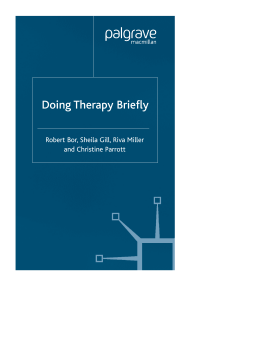
Additional Information
Book Details
Abstract
With lengthy waiting lists, reduced resources and demands for more clearly defined performance outcomes, more and more counsellors, psychotherapists and psychologists are finding themselves under pressure to provide short-term treatment for their patients. In this book the authors argue that to work briefly counsellors need not just use a diluted version of their usual longer-term therapeutic model. They suggest that to work briefly is to work differently and they present the basic principles underlying a new trans-theoretical model.
ROBERT BOR is a Consultant Clinical Psychologist at the Royal Free Hospital, London. He is a Chartered Clinical, Counselling and Health Psychologist as well as a UKCP Registered Family Therapist. He is also Emeritus Professor of Psychology at London Metropolitan University as well as Visiting Professor at City University, London. He specialized in family therapy at the Tavistock Clinic, London and is extensively involved in the training of psychologists and psychotherapists.
RIVA MILLER is a UKCP Registered Systemic Therapist. She trained as a family therapist at the Tavistock Clinic, at the Institute of Family Therapy and with the Milan Associates in Italy and currently works as a family therapist in the Haemophilia Centre at the Royal Free Hospital, London. She is Honorary Senior Lecturer at the Royal Free and University MA26 School of Medicine.
SHEILA GILL is a BACP Accredited Counsellor, UKCP Registered Independent Counsellor and an accredited Member of Counsellors in Primary Care. She is an experienced systemic therapist and trainer. She holds a Postgraduate Diploma in Counselling in Primary Care from City University and a Certificate in Systemic Therapy from Kensington Consultation Centre.
CHRISTINE PARROTT is a BPS Chartered Counselling Psychologist. She works as a counselling psychologist, devoting much of her time to writing and as a media consultant in the United States. Her special interests include the development of increased public awareness in psychology, the impact of values and ethics on the counselling process and the evolution of behaviour and emotions in people.
'If you're not familiar with - or even wary of - brief or time-limited approaches to counselling, this book provides a comprehensive introduction that could challenge your way of thinking. The whole theory behind brief thereapy is in fact an incentive to be present, to check everything out with the client, not to let things slide, hoping that they will come up later. The time is now.' - Sarah Luczaj, CounsellingResource.com, April 2008
Table of Contents
| Section Title | Page | Action | Price |
|---|---|---|---|
| Cover | C | ||
| Contents | v | ||
| Acknowledgements | vii | ||
| About the Authors | viii | ||
| Note about Clinical Cases in this Book | x | ||
| 1 Introduction and Overview of Time-sensitive Therapy | 1 | ||
| 2 Exploring ‘Brief’ and ‘Time-sensitive’ Therapy | 13 | ||
| 3 Emancipating Therapy | 26 | ||
| 4 Therapy as Conversation | 42 | ||
| 5 Assessment for Brief Therapy | 55 | ||
| 6 How have you Managed to Cope so Well? | 71 | ||
| 7 Preparing for the First Therapy Session: What to Consider | 92 | ||
| 8 Outline of the First Therapy Session: a ‘Map’ for Practice | 104 | ||
| 9 Working Positively and Briefly with a Teenager with a Serious Medical Condition: a Case Study | 129 | ||
| 10 Getting Unstuck in Therapy: Adversity as Opportunity | 145 | ||
| 11 Endings and Closure in Therapy | 169 | ||
| 12 Evidence-based and Time-limited Therapy | 184 | ||
| References | 194 | ||
| Index | 197 |
